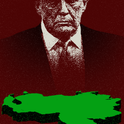Charlottesville was the latest disaster that Washington sages warned could end Donald Trump’s presidency. But for all the heat over the racists wreaking havoc in August, in one crucial and underappreciated respect his presidency had, in effect, ended the week before.
The fateful moment came when Trump signed the sanctions bill against Russia, Iran and North Korea that Congress passed with only five dissenting votes. Although he put his signature to the law, the decision about whether or not to do so was purely symbolic—when there is a two-thirds majority in both the House and Senate, any presidential veto can be overridden. So Trump had to choose between getting with the congressional programme, or wielding an ineffective veto and exposing himself as impotent—something such a proud individual was never going to do. Instead, he signed but didn’t disguise his substantive and constitutional objections to the legislation.
Make no mistake, this was an almighty surrender, because Trump came into office with an ambitious and very different foreign policy of his own. He wanted to improve relations with Russia, and to switch the aim of policy in Syria from the removal of Bashar al-Assad to the elimination of Islamic State. That agenda played a significant part in his victory. It worked to depress the Democrat vote among dovish Bernie Sanders supporters, who were unhappy with Hillary Clinton’s willingness to risk military confrontation with Russia to pursue a Syrian no-fly zone. Moreover, foreign policy is the one field in which, despite the wider gridlock in Washington, the president can ordinarily count on getting their way.
Not anymore. Trump’s flagship stance is dead at the hands of a Congress that has effectively said it is not willing for him to decide any matter to do with Russia. He was somewhat constrained from the start. Trump’s inaugural address promised big changes, but already during the transition an impediment began to emerge, in the form of allegations that members of his campaign had colluded with Moscow to subvert the electoral process. Barack Obama directly curbed Trump’s room for manoeuvre by imposing new sanctions in retaliation for the ostensible meddling. All Trump’s actions relating to Russia have since been viewed through the collusion frame.
As the congressional and FBI investigations got going, it initially looked like Trump had bought some time to make a fresh start. His decision to bomb a military site of the Russian-backed Assad regime, in response to the chemical weapons attack on rebel-held Khan Sheikhoun, met with approval in Congress. Perhaps emboldened, he reached an agreement with Vladimir Putin at July’s G20 summit for a ceasefire in southwest Syria. Rex Tillerson, his Secretary of State, said the United States and Russia were working together in Syria for the first time. In fact, the shift was much less dramatic than that, because Obama and John Kerry had temporarily embarked on a course of tacit co-operation with Russia the previous summer.
Trump did at least enjoy an apparent freedom to act, but this would not be sustained. Within days of striking his deal with Putin, the president found that members of Congress were stepping up the effort to legislate for sanctions. While the Senate passed a bill in early June, the Republican leadership in the House was initially reluctant to follow suit. But on 25th July, barely two weeks after the Trump-Putin agreement, the House passed a sanctions bill. It did so despite intense lobbying—from energy, banking and manufacturing giants—that so often succeeds.
The Act codifies as law the restrictions put in place by Obama under executive order. New constraints on doing business with Russian companies are also imposed. Henceforth the president will not be able to change this regime without congressional consent. Consequently, Trump has lost the flexibility to offer Putin some easement in future negotiations. Even if Trump can see the outlines of an artful deal to be done with Moscow, Congress has denied him the freedom to strike it.
Moreover, in creating a legal basis for extra-territorial sanctions—which bite on foreign as well as US companies—Congress is forcing a significant volte face in America’s stance towards Europe. The planned construction of the Nord Stream II pipeline is meant to deliver more gas from Russia to Germany, via the Baltic sea. The new sanctions could make the scheme harder to achieve. In attacking the project, Congress is taking sides in the bitter intra-European dispute. Ukraine, too, is stridently opposed to Nord Stream II, so US policy towards the country also shifts.
Regardless of the rights and wrongs of the sanctions, no president since Woodrow Wilson has been so overtly humiliated over foreign affairs on Capitol Hill. Congress was collectively willing to stop him acting as he wished on Russia, and it didn’t care that there would be collateral damage for US-German relations. The episode tells us how astonishingly little real support Trump now has within the Republican Party. It will make little difference whether he survives in the Oval Office or not. In foreign policy terms, he is already out of power.

Trump's position before Congress has been substantially weakened. Photo: PA
When congress said to Donald Trump: "You're fired!"
Capitol Hill has quietly terminated a noisy presidency—at least where foreign affairs are concerned
September 12, 2017











